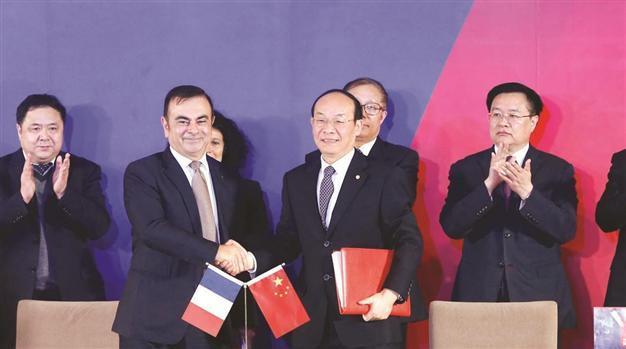Detroit of East gives green light to Renault
BEIJING / SHANGHAI - Reuters

Chairman and CEO of Renault Carlos Ghosn (front L) shakes hands with Chairman of Dongfeng Motor Group Xu Ping during their deal signing ceremony. REUTERS photo
Renault SA clinched full access to China’s auto market yesterday by sealing a joint venture agreement with state-owned Dongfeng Motor Group in Wuhan, a city fast shaping up as China’s own Detroit.
Nine years after the two companies first announced plans for the joint venture, they finally inked a $1.3 billion 50-50 partnership to introduce the French carmaker’s own locally assembled models in the world’s biggest auto market.
The deal allows Renault to fully tap demand in China, something it has been unable to do until now because of the lack of a strong local partner. China’s central government requires all foreign automakers to have a local partner to be allowed to produce cars in the country.
To build a Chinese presence, Renault has been forced to rely on imports from South Korea. Now with Dongfeng, it will invest 7.76 billion yuan ($1.28 billion) to build a factory in the central city of Wuhan, with the first car due to roll off the production line in 2016.
Renault, which has a long-standing alliance with Japan’s Nissan Motor Co with whom it shares technology, plans to manufacture 150,000 cars a year in Wuhan and set up a jointly run network of retail stores.
The carmaker’s investment is a boon to Wuhan, located about 700 km (430 miles) west of Shanghai and where the Yangtze and Han rivers intersect. The city, with a population of 17 million including its surrounding suburbs, is home to Dongfeng, China’s second-biggest automaker.
Big plans for WuhanThe Wuhan government is aiming to transform itself into a major automotive manufacturing and a logistics hub in China by attracting global automakers and their Chinese partners to open shop, which some say has turned the city into a dust-ball due to the frenzied construction activity.
Thanks to its central position and its rail, road and waterway networks it is better-positioned than other cities to become China’s Detroit - minus the bankruptcy, said Peng Zhimin, a regional economics researcher at the Hubei office of Chinese Academy of Social Sciences who advises the provincial government.
Peng sees Wuhan as a combination of Detroit, home of the U.S. auto industry, and Chicago, North America’s transportation hub.
“Wuhan has a reputation of being the Oriental Chicago. The city’s developed transportation and logistics systems give it an advantage,” Peng said. “We can easily deliver vehicles and auto components via the Yangtze River to consumers in Shanghai, for example.”
In addition to Renault, Wuhan is also home to the headquarters of Dongfeng’s joint ventures with Nissan, Honda Motor Co. and PSA Peugeot Citroen. Honda, Dongfeng and Peugeot also assemble cars in or around Wuhan.
The city, which currently has the capacity to produce roughly 1 million vehicles a year, is aiming to boost that to 3 million by 2016. Much of that planned capacity boost will come from Renault’s joint venture with Dongfeng and other global automakers such as Peugeot, which is close to getting a sizeable capital injection from Dongfeng.
Reuters reported last week that Peugeot’s board had approved an outline deal that would see the French state and Dongfeng take matching 20 percent stakes in Peugeot with a share issue to be priced at below 7 euros a share.Peugeot said on Thursday that discussions with Dongfeng were at a “preliminary stage”, with no guarantee they would conclude successfully.
The French carmaker’s venture will also benefit Nissan, which has been operating in China in a joint venture with Dongfeng since the early 2000s. Japan’s second-biggest carmaker has two manufacturing centres within a 470-km radius of Wuhan in the cities of Zhengzhou and Xiangyang.
“Between Renault and Nissan in this three-city triangle of auto-manufacturing operations, we plan to use commonised vehicle underpinnings and major parts,” a senior Nissan executive in Yokohama said.
He declined to be identified because he is not allowed to speak to the media. Wuhan has already successfully attracted General Motors Co and its Chinese partner SAIC Motor Group. The companies started building an assembly plant in the city capable of producing 300,000 cars a year.
